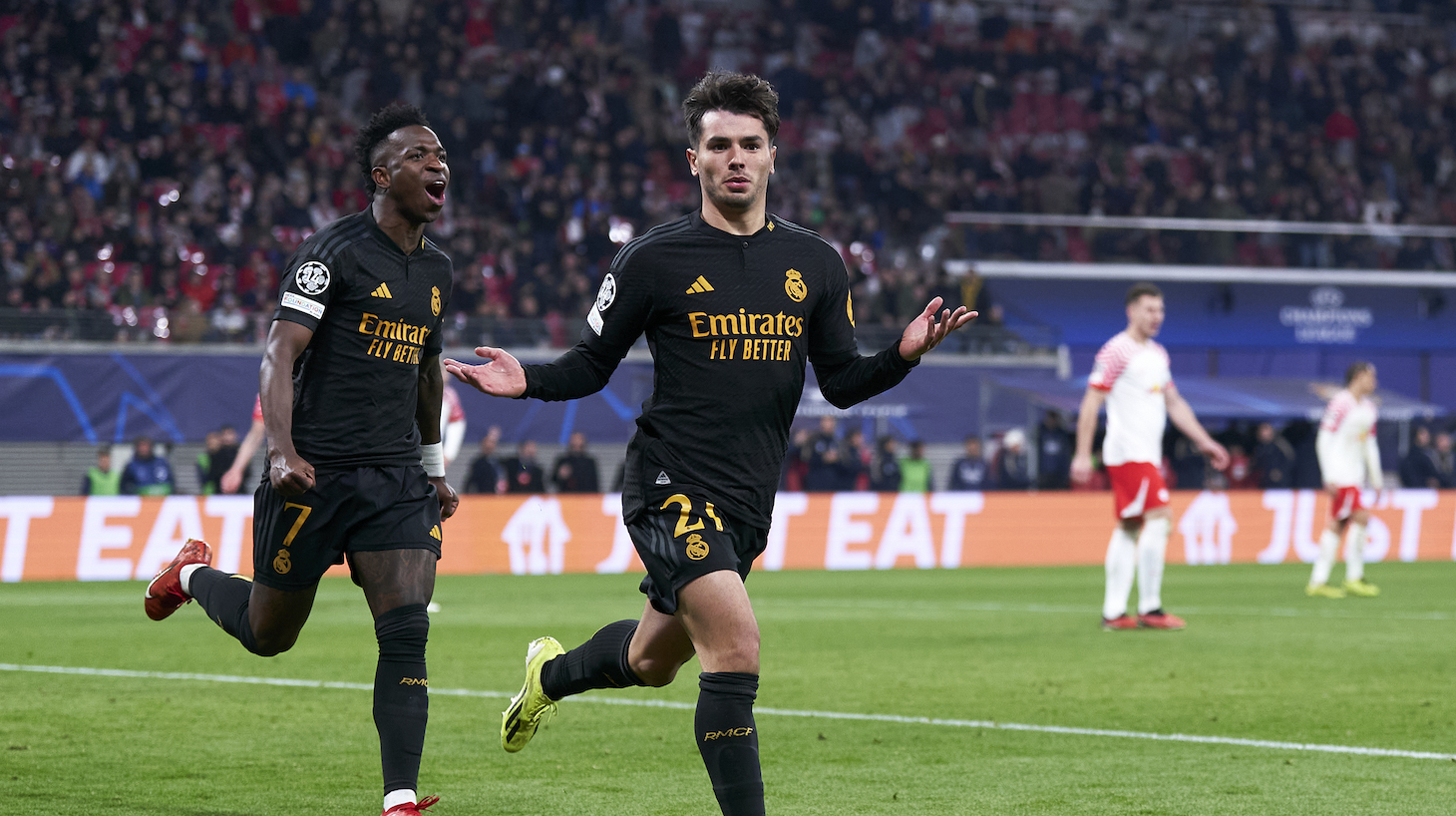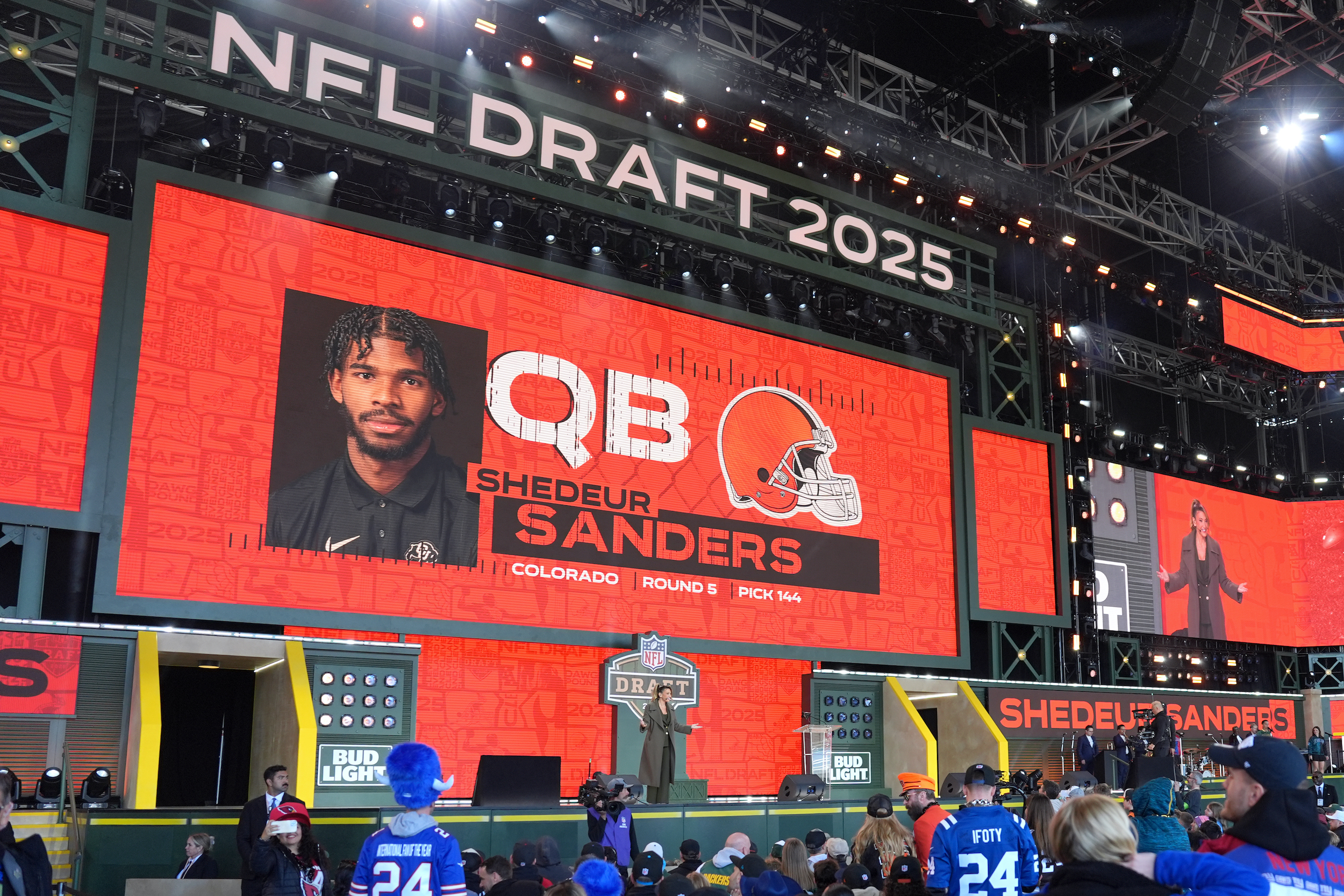Brahim Díaz is not one of Real Madrid's stars. Indeed, in a Real team that lived up to its galactic ambitions, he'd probably hardly see the pitch. The 24-year-old does not lack for talent, which is why he was widely considered a proto-star going back to his teen years, and the legitimately dazzling feats he can muster with the ball are what have already brought the skittering midfielder to the benches of illustrious clubs like Manchester City, AC Milan, and Real Madrid. Still, he's yet to show any real consistency, and his inability to contribute much to the game outside of his intermittent moments of pizazz makes him relatively useless when his elaborate jinks aren't coming off. But even though Brahim isn't the type of player Real typically builds itself around, he does possess the particular qualities of the kind of Real player who, from time to time, can burn as brightly as anyone.
Tuesday's Champions League round of 16 match between Madrid and Leipzig was a bit of an odd one for the Spaniards. Though the tournament is traditionally the club's main focus in any given season, this was the rare week when the European knockout tie was not in fact the biggest game on Real's schedule. That status was reserved for the Saturday's league clash with high-flying Girona, in a head-to-head faceoff between La Liga's two title contenders. In it, the Blancos put together one of their finest performances of the season. The emphatic and potentially dream-killing 4-0 Real win was a showcase for the team's two superstars. Jude Bellingham scored twice, Vinícius scored once and assisted two others, and the pair demonstrated yet again that, outside the recently reunited power couple in Manchester, the Blancos possess arguably the most potent attacking duo in soccer today. But if Saturday's match showed just how good this team can be when led by its best two players in full pomp, Tuesday's outing in Germany was a demonstration of both the team's enduring flaws and its uncanny ability to overcome them, even without relying on its biggest names.
The Leipzig match, like Madrid's season as a whole, was marked by who wasn't suited up in a Real Madrid jersey. Bellingham came off a little gimpy in the Girona game (though thankfully it doesn't appear to be anything serious), so he was unable to feature against Leipzig. That made the Englishman the latest addition to the distressingly long Merengue injury list, one that currently includes Thibaut Courtois, Éder Militão, David Alaba, and Antonio Rüdiger. As you can tell from that list of names, it's Real's defense that has been most affected by the injuries, and the Blancos' defensive frailty was the match's biggest conditioning factor. Especially in the first half, Leipzig's one-speed-fits-all style of breakneck counterattacking ran Real's back line ragged. In the center back pairing of Nacho Fernández and Aurélien Tchouaméni, somehow it was the latter, a natural midfielder, who was routinely called over to wipe the former's ass when Leipzig's strikers ran straight past Madrid's one healthy true central defender.
Though Leipzig found itself sprinting clear through on goal on multiple occasions, the Germans failed to ever really put the visitors to the sword. In part this was because Leipzig lacked the touch of class and composure to better choose and execute its final passes and shots—a common side effect of playing without a brake pedal. But it was also because Andriy Lunin, Courtois's backup who appears to have definitively beaten Kepa Arrizabalaga for the starting keeper job in the Belgian's absence, had the game of his life. The Ukrainian keeper never had to make the type of impossible saves Courtois did in his iconic performance against Liverpool in the Champions League final two years ago, but his nine stops and his command of the aerial game kept the home team from making its first-half dominance tangible on the scoreboard. I'm going to include this Lunin highlight reel to give some well-deserved shine to the goalkeeper, and also because the soundtrack choice makes me laugh every time I press play:
Andriy Lunin's all timer performance.
— ultrarmcf 🇧🇷 (@ultrarmcf_) February 14, 2024
RB Leipzig 's nightmare.😮💨 pic.twitter.com/v6DnPNoRc6
Lunin, subbing in for Courtois, was the one who kept Madrid in the match, but it was Brahim, taking the field in place of Bellingham, who won it. The Spaniard was fantastic all match long. In a sluggish Real lineup, Brahim was practically the only player who showed the determination and inspiration to make the difference. He floated around the pitch from his favored No. 10 position in Madrid's 4-3-1-2 formation, sneaking into open spaces between the lines and then twisting and feinting away from Leipzig's harassing pressers once they detected him. He danced past challenges in narrow lanes with the calm of an expert tightrope walker. And where the almost unfailing success of his ornate turns and dribbles and carries might've led him to attempt further baroque interventions, his decision-making with the ball was clear-eyed, simple, and effective.
Plays of those sorts are what Brahim has always been known for, and is the stuff of plenty of gifted, tiny attacking-mid types. But what was truly extraordinary about Tuesday's performance were the 10 seconds or so when Brahim basically became Lionel Messi:
It was hard to know what to expect from Brahim coming into this season. He'd spent the previous three years on loan at AC Milan. There, despite being a regular starter in a Milan team that finally started to recapture some of the old glory, he never made himself indispensable. The Rossoneri weren't convinced enough by his exploits with them to buy him at the end of his loan. Thus he found himself back with the Blancos, three years older than when he left for Italy but still with essentially the same prognosis: young player capable of thrills, but too inconsistent to be reliable. The best Madrid could offer him was a chance to compete for backup minutes with the likes of Luka Modric, Arda Güler, Dani Ceballos, and Nico Paz.
But while Brahim is hardly anyone's idea of a regular Real Madrid starter, he has emerged as an ideal Real Madrid rotation player. There's a funny thing about Real. It is, famously, the club of stars—it craves them, hoards them, and places so much pressure on them that even big, established stars sometimes collapse under the weight. However, those same pressures can, in the right circumstances, elevate lesser players. There's something about a shirt so synonymous with superstars that can make relatively average players feel like one when wearing it. It takes a certain mentality—unwavering faith in one's own ability, willingness to bide one's time, determination to come good once the opportunity arises—but with it, plenty of non-stars have played like stars with the Madrid crest on their chest.
Brahim is precisely this sort of player. In spot starts this season, often as Bellingham's understudy, Brahim has shined almost every time he's taken the pitch. He speaks the same collaborative, flowing language of Vinícius and Rodrygo, and so he fits alongside them in attack like fingers in a glove. Liberated from any expectations as a rotation option, he plays with freedom and confidence, and, like on Tuesday, always looks eager to show that he can make the difference. And he's done just that, having already scored a career-best eight goals in all competitions this season, none better than his Messi-esque strike against Leipzig.
Successful Real Madrid seasons always need their share of Brahims, backup players to whom the team can turn to compensate for injuries or give the starters a breather, who are capable of shining nearly as brightly as the missing stars, even if the effect is a reflection of the white shirt's own gleam. This season it's Brahim and Lunin, when before it was Marco Asensio and Nacho and Isco and so many others. Of course, if Real wins the trophies it's going for this season, it will mostly be because of Bellingham and Vinícius and Kroos—the team's real-deal stars. But every now and then there will be the chance for Brahim to be the one with his arms spread wide, welcoming in the adoration of the crowd after a sensational winning goal, and that sounds like a pretty good fate, too.






